Thanks to the highest inflation rates we've seen in the U.S. since the early 1980s, the Federal Reserve has decided to hike interest rates in an attempt to slow spending. This 0.75 percent rate hike is the biggest since 1994, and is expected to deeply restrict borrowing. The Fed's actions will "trickle up" to the many interest rates, especially mortgage rates, paid by consumers and businesses. So high interest is now a fact of life. How can you use this knowledge to benefit your portfolio?
General Rule on Interest and Stocks
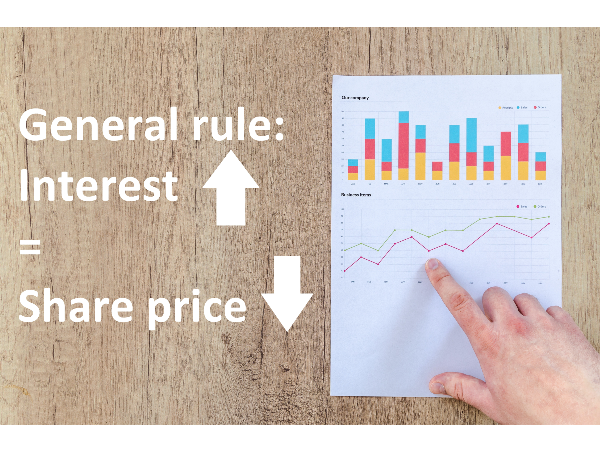 Unfortunately, higher interest rates tend to hurt stock value. The added expense of borrowing under higher interest rates will reduce corporations' net income, and also reduce the value of shares using the Dividend Discount Model (DDM). By requiring more revenue to pay off debt, higher interest rates increase the required rate of return used to determine share value:
Unfortunately, higher interest rates tend to hurt stock value. The added expense of borrowing under higher interest rates will reduce corporations' net income, and also reduce the value of shares using the Dividend Discount Model (DDM). By requiring more revenue to pay off debt, higher interest rates increase the required rate of return used to determine share value:
Share value = dividend per share / (required rate of return - dividend growth rate)
With low interest rates, firms don't need to generate as high a rate of return to be profitable. As interest rates rise, firms must generate higher and higher rates of return. This is tough to meet, and so it lowers the share price.
Avoid Start-ups
 Of course, recessions hurt most investments. But higher interest rates, whether or not they trigger a recession, will especially hurt corporations that need to borrow heavily. Start-ups are likely to be especially sensitive. Even if start-ups don't need to borrow money, their delayed profits force investors to discount their eventual profits by higher interest rates today. When high interest rates are eating away at your profits, you are less likely to wait 5-10 years for a start-up investment to pay off.
Of course, recessions hurt most investments. But higher interest rates, whether or not they trigger a recession, will especially hurt corporations that need to borrow heavily. Start-ups are likely to be especially sensitive. Even if start-ups don't need to borrow money, their delayed profits force investors to discount their eventual profits by higher interest rates today. When high interest rates are eating away at your profits, you are less likely to wait 5-10 years for a start-up investment to pay off.
Avoid Real Estate
 2021 was hot for real estate, but rising interest rates will cool things off fast! The housing market is very cyclical, as is the market for new cars and other durable goods that must be financed (money borrowed to purchase). As mortgage rates hit 5 or even 6 percent, prospective home buyers are likely to shy away and remain in their apartments for another year.
2021 was hot for real estate, but rising interest rates will cool things off fast! The housing market is very cyclical, as is the market for new cars and other durable goods that must be financed (money borrowed to purchase). As mortgage rates hit 5 or even 6 percent, prospective home buyers are likely to shy away and remain in their apartments for another year.
Consider Financial Stocks
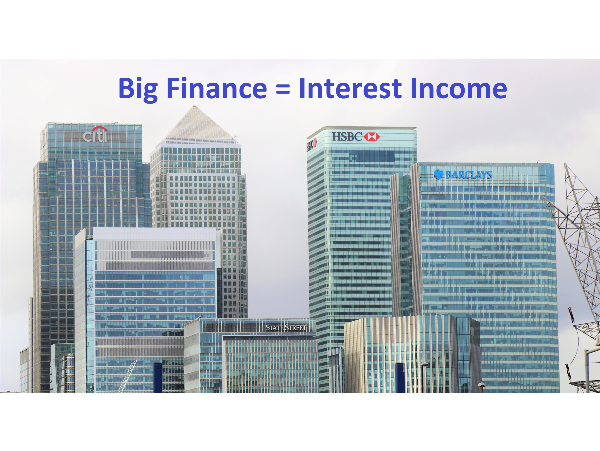 While high interest rates reduce borrowing, those who continue to borrow must pay more interest. Thus, finance stocks tend to be okay when interest rates rise. These include big banks and investment firms. Banks are making increased interest income, and also see an influx of business as people want to save their money and take advantage of higher interest rates on savings accounts and CDs. Investment firms see increased activity in trading, especially as investors may want to convert their holdings of bonds to equities (stocks).
While high interest rates reduce borrowing, those who continue to borrow must pay more interest. Thus, finance stocks tend to be okay when interest rates rise. These include big banks and investment firms. Banks are making increased interest income, and also see an influx of business as people want to save their money and take advantage of higher interest rates on savings accounts and CDs. Investment firms see increased activity in trading, especially as investors may want to convert their holdings of bonds to equities (stocks).
Stick With Blue Chips
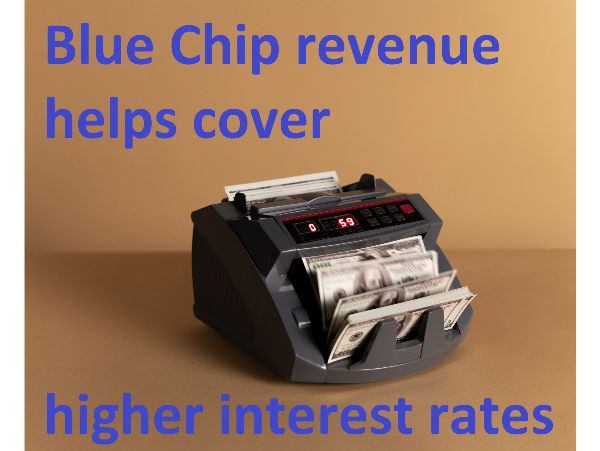 High interest rates can be a big barrier to entry for start-ups, and the ones who can sail through high interest rates and a recession are established corporations with lots of cash and a propensity for healthy revenue. These are large blue chip firms whose names you know. Demand for their products tend to remain stable, such as health care and home maintenance products. Entertainment and fast food also make the grade, as people tend to want a stress release during depressing times.
High interest rates can be a big barrier to entry for start-ups, and the ones who can sail through high interest rates and a recession are established corporations with lots of cash and a propensity for healthy revenue. These are large blue chip firms whose names you know. Demand for their products tend to remain stable, such as health care and home maintenance products. Entertainment and fast food also make the grade, as people tend to want a stress release during depressing times.
I/we have no positions in any asset mentioned, and no plans to initiate any positions for the next 7 days
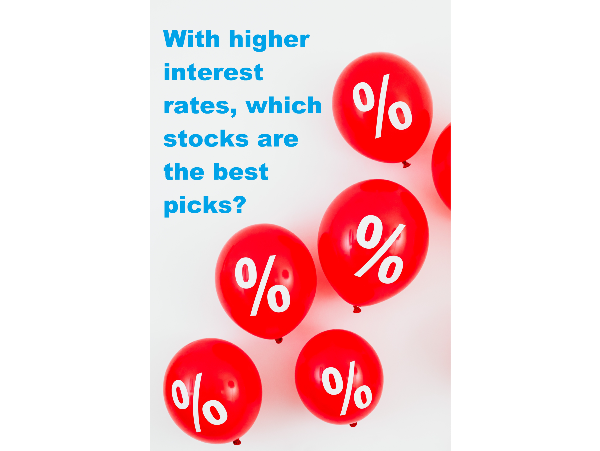




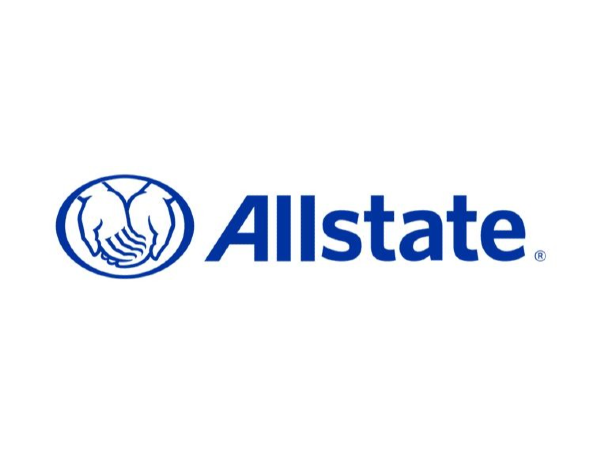
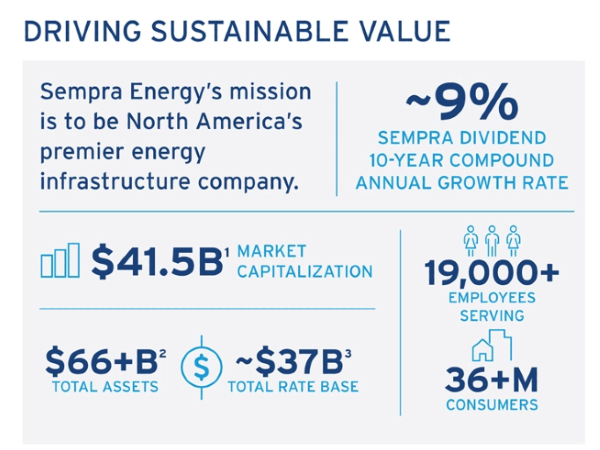
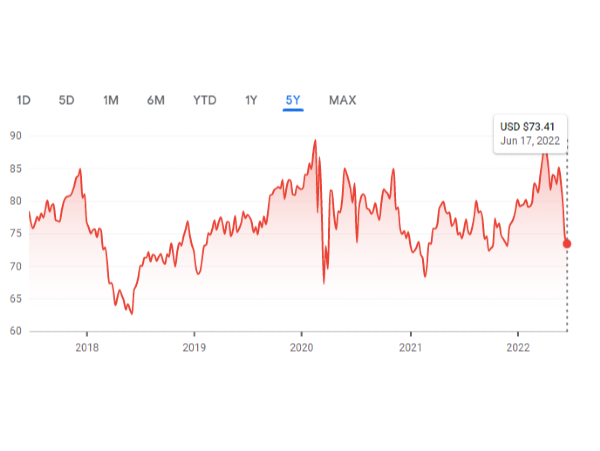


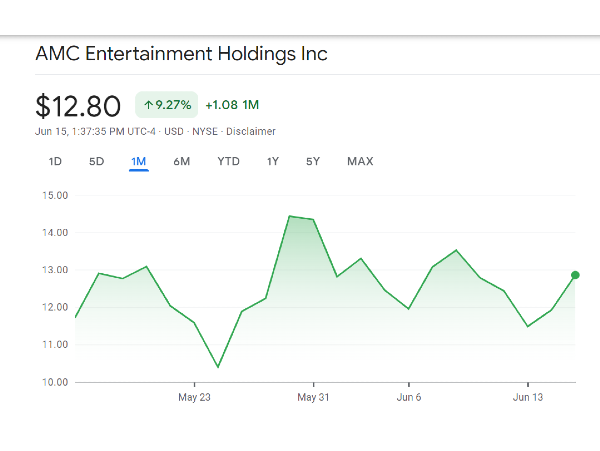
















Thanks to the highest inflation rates we've seen in the U.S. since the early 1980s, the Federal Reserve has decided to hike interest rates in an attempt to slow spending. This 0.75 percent rate hike is the biggest since 1994, and is expected to deeply restrict borrowing. The Fed's actions will "trickle up" to the many interest rates, especially mortgage rates, paid by consumers and businesses. So high interest is now a fact of life. How can you use this knowledge to benefit your portfolio?
General Rule on Interest and Stocks
Share value = dividend per share / (required rate of return - dividend growth rate)
With low interest rates, firms don't need to generate as high a rate of return to be profitable. As interest rates rise, firms must generate higher and higher rates of return. This is tough to meet, and so it lowers the share price.
Avoid Start-ups
Avoid Real Estate
Consider Financial Stocks
Stick With Blue Chips
I/we have no positions in any asset mentioned, and no plans to initiate any positions for the next 7 days